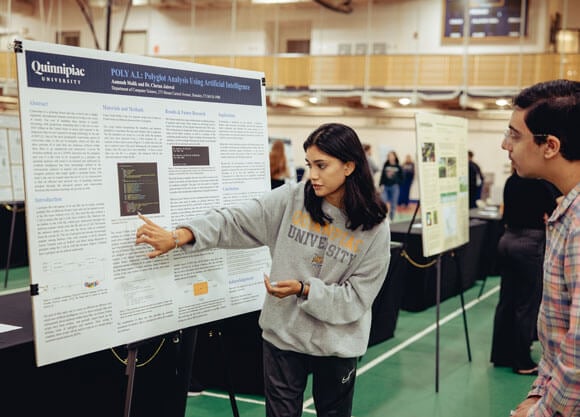
Student research, collaboration take center stage at first Exploratorium
October 10, 2023

October 10, 2023

But through their on-the-job training as account executives, the team was fully prepared to respond when a local nonprofit executive stopped by their table and asked about hiring them.
The Agency was just one of the 70 student presentations highlighted during the inaugural Exploratorium on Saturday. With topics ranging from student-designed video games to transgender representation in film to immersive learning in Portugal, the event provided students with an opportunity to practice their presentation skills and publicly display their scholarly research, innovative thinking and collaborative experiential projects.
“This is an event that is designed to showcase the excellent faculty, student research, and other types of exemplary teaching and special projects that occur on campus,” said Wesley Renfro, Exploratorium planning committee member and senior associate dean for academic affairs and strategic initiatives in the College of Arts and Sciences. “This event was a way to give our alumni and friends on campus for Bobcat Weekend a chance to see some of the amazing things that occur in our classrooms and in our research spaces.”
The creative energy filling the symposium aisles was a stimulating kick-off to a busy Saturday during this year’s Bobcat Weekend that welcomed more than 4,000 families and students and over 600 alumni to campus, with more than 500 people registered to attend Exploratorium.
“The thing that interested me most was the sheer diversity of topics,” said Renfro. “There's a lot that we do here at Quinnipiac that doesn't fit within a class that meets on Monday, Wednesday and Friday from 9 to 9:50 a.m. We do things very well in the classroom, but that’s only part of the story.”
All Quinnipiac students actively engage in research, creative endeavors and other forms of innovative thinking. Through Exploratorium, the Bobcat community could gain a snapshot of the scholarly excellence happening across the university every day. Projects highlighted the university’s commitment to interdisciplinary collaboration between humanities and STEM-related programs, as well as student projects with Quinnipiac University Interdisciplinary Program for Research and Scholarship (QUIP-RS).
Dawn and Mark Donetz found Exploratorium to be both personally and professionally rewarding as lifelong public-school educators and parents of first-year psychology major Alexandra “Allie” Donetz ’27. They toured Exploratorium with Dawn’s parents Marie and Anthony Barckett, a recently retired 50-year educator himself.
“College is about more than just getting to graduation. It's about the research students can conduct and exploring opportunities, options and new avenues for careers,” said Dawn. “Today, having a major in psychology doesn't necessarily mean you're going to be a psychologist. It’s exciting to walk around this symposium and truly see all Quinnipiac has to offer its students.”
Game design major Nathaniel Pippin ’24 demonstrated his team’s healthcare-inspired QU IPE Escape Room created for the School of Health Sciences with funding from the Faculty Scholarship and Creative Works Impact Fund. Pippin along with brothers Matthew ’24 and Michael Merritt ’24, worked with faculty to create a digital version of the North Haven campus in-person escape room, where students work collaboratively to determine a patient’s identity, contact his caretaker and escape the room.
At a nearby table, School of Business marketing major Emelin Gustafsson ’24 shared her market research findings on emotional support animals (ESAs), with the goal to eliminate some of the distrust toward ESA owners and their need for support animals in public spaces. Their timely research is in line with her goal to pursue a career in market research after graduation.
“I had the wonderful privilege to work alongside one of my market research professors for this project. We're exploring how self-efficacy and nature relatedness influence attitudes toward emotional support animals and emotional support policies,” said Gustafsson. “Not just for traditional ESAs like cats and dogs, but also snakes, spiders, and as someone just brought to a Phillies game this week, alligators. Because they really do have a positive impact on people who need them.”
Presenters at the event also included Professor of Anthropology Julia Giblin, who spent time wandering through the aisles of colorful posters before rejoining her team of students at their poster presentation highlighting this summer’s archaeology research in Hungary.
“I value having a sense of the diversity and creativity of experiences our students and faculty are engaging with across campus. I'm learning as a participant as well,” said Giblin. “This type of scholarship is a part of our culture at Quinnipiac, and I love that we are really celebrating research today.”
Joining Giblin in presenting their research poster “Studying Cremation Burials in Bronze Age Funerary Urns from Hungary” were sociology major Remi Sheibley ’25 and biology major Melissa Trudeau ’25.
“I think teaching is about helping other people learn about the world,” said Trudeau. “I’m grateful to be able to go to a different country and experience this type of curation process first-hand. Handling bones that are thousands of thousands of years old was just an incredible learning opportunity.”
Nodding in agreement, Sheibley added: “I could not have the future that I have right now if it wasn't for this experience. With these types of opportunities, Quinnipiac is setting us all up for success.”
Quinnipiac Today is your source for what's happening throughout #BobcatNation. Sign up for our weekly email newsletter to be among the first to know about news, events and members of our Bobcat family who are making a positive difference in our world.
Sign Up Now